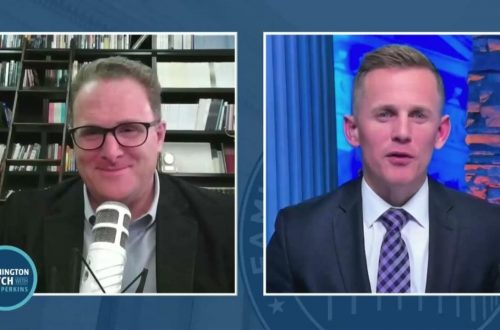I am fast becoming a big fan of S. M. Hutchens of Touchstone Magazine. Mr. Hutchens’ writes with an uncommon wit and insight that you just don’t see very often. In a recent post on Touchstone’s “Mere Comments” blog, Mr. Hutchens argues that liberals hate George W. Bush because they view him as a proxy for God. The essay is titled “God’s Whipping Boy,” and it says,
Here, I believe, is where you will find the core of the hatred. Mr. Bush in fact stands for . . . all that is named by liberals in their litany of evil: bigotry, exclusion, fundamentalism, and the rest.
At the heart of it is the ferocious resentment of modern people who wish to regard themselves as deeply moral, against those who persist in pointing to an ancient and uniform tradition bearing witness to a God who not only says they’re not, but that they are attempting, in direct opposition to his law and will, to establish things in the world that he himself hates.
The liberal, for many reasons, knows better than to hold forth against God, whom he perceives still controls a substantial voting bloc, so he must find a man to crucify. There is no one in our day that more clearly stands at the confluence of politics and traditional faith than the American president. He is the logical vent toward which all the pent-up anger at the biblical God and his priggish, self-righteous, ignorant, backwards, narrow-minded, reactionary, atavistic, hate-filled, soi-disant partisans naturally rushes. That Mr. Bush is even more understated about his personal faith than Mr. Clinton makes little difference—nor, as a matter of fact do most of his policies, a good many of which, even the war in Iraq, are weakly conservative, and have bipartisan support. The real parties and deepest party loyalties here in view here are not, strictly speaking, political. They pertain to a new morality that claims evolutionary superiority, against an old morality that claims to be the Only One, written on tablets of stone as well as on every human heart.
I do not think that Mr. Hutchens is identifying support for President George W. Bush as the sine qua non of Christian discipleship, nor would I agree with such a proposition if he were. But I do think he is on to something here.
President Bush is perceived (and I think wrongly) by many to be the promoter-in-chief of evangelical faith–a faith that is caricatured as exclusive, bigoted, and imperialistic. Yet the scriptures do not designate the U. S. President as God’s chief representative on earth, nor do the scriptures identify any political leader as the chief administrator of God’s redemptive purposes in the world. But those facts have not prevented some people (both liberal and conservative) from thinking otherwise.
I suppose it’s debatable as to whether liberals really make this connection between President Bush and evangelicalism (as Hutchens’ alleges). What is not debatable, however, is that the human heart naturally rebels against the God Who is there and with Whom it has to do (Romans 3:9-18; Hebrews 4:13). When humans try to suppress the knowledge of God that is manifest everywhere around them and in them (Romans 1:18-23; 2:14-16), sometimes they do so by attacking the ones whom God has appointed as His ambassadors in the world (John 15:18-25). And in as much as President Bush is perceived to be the figure-head of Evangelicals (how ever wrong that perception may be), he will be taking flak aimed at God.
To agree or disagree with Hutchens’ essay is ultimately of little consequence. It is, however, absolutely critical for evangelicals to remember why it is that the nations rage (Psalm 2). They are not ultimately put off because of a president or his policies, but because of a King who claims to be the King of all Kings and who commands the obedience of the nations. To be attached to that King might earn you the scornful title of “whipping boy,” but it will also redound to a weight of glory far beyond all comparison (2 Corinthians 4:17-18).




One Comment
S.M. Hutchens
You have correctly discerned, Dr. Burk, what I was attempting to say. For this alone I give hearty thanks, for so many who respond to my blogs clearly don’t try very hard.
The point is principally about how the President is perceived and used–what he symbolizes to his most violent detractors–and only secondarily about his actual beliefs and policies, these being significant because they are not inconsistent with his modestly traditional Christianity. Because he is a political figure against whom it is fair to have strong partisan opinions, he serves in our present historical situation as the most natural conduit for hatred of God.
I don’t say this only because there seems to be a surplus of hatred directed at him, going considerably beyond even the strongest political odium I have seen (although it was this to which I pointed in my blog) but because of the particular character and intensity of the hatred, which I am used to seeing in people who are struggling to overcome the condemnation of their consciences and need someone other than themselves upon whom to lay the guilt of their sins.